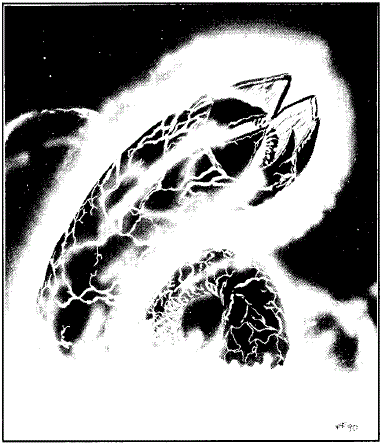
| Climate/Terrain: | The Sun, elemental plane of Fire |
|---|---|
| Frequency: | Uncommon/common |
| Organization: | Solitary |
| Activity Cycle: | Any |
| Diet: | Omnivore |
| Intelligence: | Animal (1) |
| Treasure: | Nil |
| Alignment: | Neutral |
| No. Appearing: | 1d2 |
| Armor Class: | 5 |
| Movement: | 6 (20 running for 1d4 segments) |
| Hit Dice: | 6 |
| THAC0: | 15 |
| No. of Attacks: | 2 |
| Damage/Attack: | 2d4/2d4 |
| Special Attacks: | Breath weapon |
| Special Defenses: | Immune to all fire damage |
| Magic Resistance: | Nil |
| Size: | M (5' long) |
| Morale: | Steady(11-12) |
| XP Value: | 650 |
The lavaworm looks as though it is made of living semimolten rock. It moves about like an inchworm, hunching its body up as it moves its end forward, and lowering its body as its head moves forward. The creatures has a large maw at either end which periodically expels a noxious gas smelling strongly of sulfur. The creature can grow to be five feet long and nine inches in diameter.
The lavaworm is a dull brown or reddish color. It tends to have an elastic epidermis which stretches when it moves or attacks. Its two mouths are lined with sharp needle-like teeth. It also possesses two sets of eyes, with a pair on each end of its tubular body. This gives the impression that there is no back end to the creature, but there is. The creature's rear mouth is somewhat smaller that the front, and the creature never travels backwards.
Combat: This creature attacks anything cooler than itself that moves. It has the ability to move at a rate of 20 for 1d4 segments. When it uses this movement form, it always surprises its opponent. It can use this jump in speed only once every five rounds.
When the lavaworm attacks, it bites with its incredibly hot maw, inflicting 2d4 points of damage. Half of the damage is associated with its intense body heat. It can strike with its rear-mounted mouth only when the front mouth strikes, and then it has a -3 penalty to the attack die roll. The rear mouth does the same amount of damage as the front.
Every five rounds, this creature spews a great cloud of sulfuric gas, which blinds anyone within a 20-foot radius, a successful saving throw vs. breath weapon preventing it. The resulting blindness lasts for 1d6 rounds. It is possible for an affected characters to suffer blindness for a certain number of rounds, only to fail another saving throw before those rounds are over.
Habitat/Society: These creatures never attack fire elementals or other creatures which exhibit at least the same temperature as their own, unless they are looking for a creature on which to lay their eggs. They eat only creatures with lower external temperatures.
When these creatures mate, the female lays eggs on the hottest location she can find. Usually this is on creatures like the efreeti, Helian or even other lavaworms. The extreme heat is needed for the eggs to hatch. Around 500 eggs are hatched from one incubation. These young lavaworms eat their way into the creature they are attached to and then proceed to eat everything that is within reach.
Unfortunately, this usually kills the host rather quickly. Once the host is dead and its body only a husk, the lavaworms then begin to eat each other, until they are one week old. At that point, they emerge from the creature's body as one-half Hit Die monsters, and go their separate ways.
lavaworm continues to grow until it is one year old, gaining one-half Hit Die every month. At the end of the year, the lavaworm is full grown, and it begins looking for a mate. Once the breeding process is complete with the female, the male lavaworm searches for other females to mate with. After a seven-day period is over, the male lavaworm never again mates, turning permanently sterile thereafter. The female, on the other hand, is able to mate every year for its entire life.
When this sterile stage of the male lavaworm comes about, it attempts to find a location that is not inhabited by any other lavaworm, claiming this location to hunt and live in. Territorial instincts completely take over the creature, which fights to its very end in order to preserve its hunting space. Whenever a lone lavaworm is found, it is usually of this sterile male variety. There have been reports of these lavaworms getting as big as 20 or 30 feet in length, with tremendous maws four feet in diameter.
